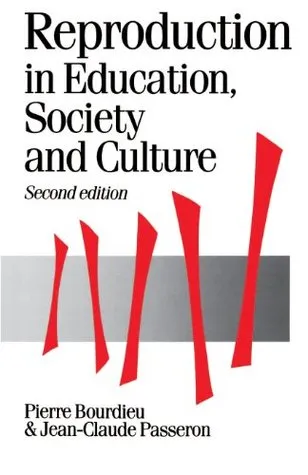Reproduction in Education, Society and Culture (Theory, Culture Society)

Unveiling the Dynamics: "Reproduction in Education, Society, and Culture" by Jean-Claude Passeron and Pierre Bourdieu
Introduction
"Reproduction in Education, Society, and Culture" by Jean-Claude Passeron and Pierre Bourdieu isn't just a book; it's a thought-provoking exploration into the intricate dynamics of education, societal structures, and cultural reproduction. As someone who has navigated the educational landscape, this book became a guiding light, illuminating the often unseen forces that shape our educational experiences. Join me as we delve into the pages of this seminal work.
A Journey Through Education
The Educational Landscape
My journey through education has been a rollercoaster of experiences—moments of triumph, challenges, and a constant negotiation between personal aspirations and societal expectations. "Reproduction in Education, Society, and Culture" promised to provide a framework for understanding the deeper currents that influence the educational journey.
Unpacking Cultural Reproduction
Societal Structures at Play
Inequality and Cultural Capital
Passeron and Bourdieu delve into the concept of cultural reproduction, where societal structures perpetuate inequalities through the transmission of cultural capital. The book becomes a lens through which we can analyze how educational systems contribute to the reproduction of social hierarchies.
Personal Anecdote: The Weight of Expectations
Reflecting on my own educational journey, I could identify moments where societal expectations seemed to shape the path ahead. The authors' insights resonated as I considered how cultural capital, often taken for granted, plays a significant role in educational outcomes.
The Role of Habitus
Shaping Perceptions and Choices
Habits, Attitudes, and Cultural Patterns
Bourdieu's concept of habitus comes to the forefront, emphasizing how deeply ingrained habits, attitudes, and cultural patterns shape individuals' perceptions and choices. "Reproduction in Education, Society, and Culture" becomes a guide to understanding the subconscious influences that mold our educational trajectories.
Personal Anecdote: Navigating Habitus
Recalling moments when my choices aligned with or deviated from familial and societal expectations, I realized the silent influence of habitus. The book prompted me to reflect on how cultural predispositions can act as both guides and constraints in the educational journey.
The Power of Symbolic Violence
Invisible Forces at Play
Subtle Mechanisms of Control
The authors introduce the concept of symbolic violence, highlighting the subtle mechanisms of control that operate within educational institutions. The book encourages readers to critically examine the power dynamics that may go unnoticed but play a significant role in shaping educational experiences.
Personal Anecdote: Unseen Pressures
Thinking back on instances where certain norms or expectations seemed unquestionable, the notion of symbolic violence became clearer. "Reproduction in Education, Society, and Culture" prompted me to question the invisible pressures that may influence decision-making within educational contexts.
Conclusion
In conclusion, "Reproduction in Education, Society, and Culture" is a compelling journey into the underlying structures that shape our educational experiences. Passeron and Bourdieu's work serves as a mirror, reflecting the often unnoticed forces at play and inviting readers to engage in a critical dialogue about the broader implications of educational systems.
So, if you're ready to embark on a reflective exploration of education's intricate tapestry, "Reproduction in Education, Society, and Culture" awaits—an enlightening read that challenges us to question, understand, and potentially reshape the dynamics that govern our educational journeys.